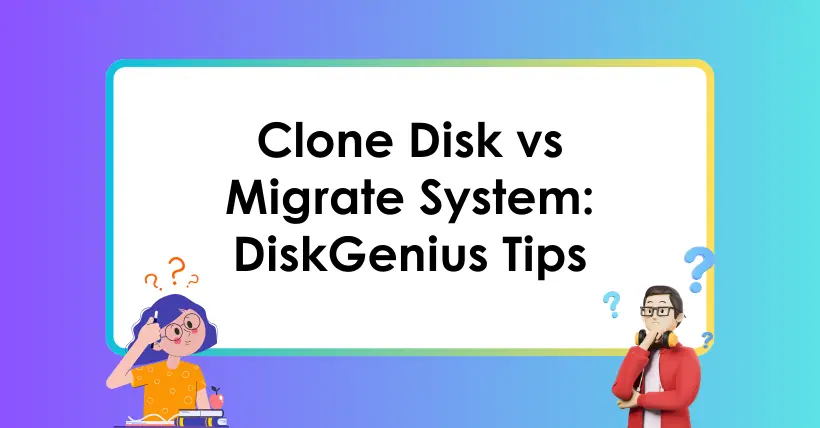01
Question – Differences between Clone Disk and Migrate System
The system migration and disk cloning of DiskGenius both seem to be cloning the hard drive? What are the differences? When should I choose one over the other?
02
Answer – Differences between Clone Disk and Migrate System
DiskGenius is a long-standing and excellent Chinese software for disk management.
Both its disk cloning and system migration essentially involve copying (cloning) the data on the disk.
Therefore, using the disk cloning method can also achieve system migration.
However, the two differ in operation based on the user’s specific needs.
03
Differences between Disk Cloning and System Migration in DiskGenius
- Disk Cloning
- Operation:
Disk cloning is relatively straightforward. It copies all partitions, files, and other data from the source disk to the target disk.
Users only need to select the source disk and target disk, with limited additional options. - Features:
- Creates identical partitions on the target disk with the same size and type as the source disk.
- Offers three cloning modes:
- Sector-by-sector copy: Copies all sectors regardless of data validity (slow but thorough).
- Copy by file system structure: Copies only valid sectors, maintaining the original data structure (faster).
- Copy by file: Copies files while reorganizing data, reducing file fragmentation (fastest).
- Target disk capacity must meet the requirements based on the selected mode.
- Use Case: Ideal for creating a full backup of a disk or preparing an exact replica.
- Operation:
- System Migration
- Operation:
System migration allows users to customize the cloning process. In addition to the mandatory system partition, users can select other partitions and adjust the size of target disk partitions.
It also configures partitioning and boot settings on the target disk as needed. - Features:
- Commonly used to migrate a system to a new SSD or another disk.
- Supports UEFI boot configuration and offers “Hot Migration” (without restarting) or migration via WinPE.
- Simplifies the process of transitioning to a new disk while maintaining the operating system, installed software, and data.
- Use Case: Designed for upgrading to a new disk without reinstalling the OS or applications.
- Operation:
04
Summary of Key Differences
- Purpose:
- Disk cloning creates an exact copy of the entire disk.
- System migration focuses on moving the operating system with selected partitions.
- Customization:
- Disk cloning has fewer options.
- System migration allows partition selection and resizing, with additional boot setup.
- Ease of Use:
- Disk cloning is simpler but less flexible.
- System migration is tailored for system transitions and provides more control.
Before performing either operation, always back up important data on the target disk, as both processes will overwrite its contents.

Disclaimer:
- This channel does not make any representations or warranties regarding the availability, accuracy, timeliness, effectiveness, or completeness of any information posted. It hereby disclaims any liability or consequences arising from the use of the information.
- This channel is non-commercial and non-profit. The re-posted content does not signify endorsement of its views or responsibility for its authenticity. It does not intend to constitute any other guidance. This channel is not liable for any inaccuracies or errors in the re-posted or published information, directly or indirectly.
- Some data, materials, text, images, etc., used in this channel are sourced from the internet, and all reposts are duly credited to their sources. If you discover any work that infringes on your intellectual property rights or personal legal interests, please contact us, and we will promptly modify or remove it.








